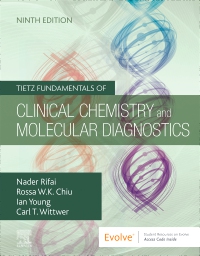
Tietz Fundamentals of Clinical Chemistry and Molecular Diagnostics - Elsevier EBook on VitalSource, 9th Edition
Elsevier eBook on VitalSource

Now $113.04
**Selected for Doody’s Core Titles® 2024 with "Essential Purchase" designation in Laboratory Technology**
Master clinical lab testing skills with the condensed version of the Tietz Textbook! Designed for use by CLS students, Tietz Fundamentals of Clinical Chemistry and Molecular Diagnostics, 9th Edition provides a streamlined guide to the clinical chemistry knowledge you need to work in a real-world, clinical lab. Coverage ranges from laboratory principles to analytical techniques and instrumentation, analytes, pathophysiology, and more. New content keeps you current with the latest developments in molecular diagnostics. From highly respected clinical chemistry educator Nader Rifai, this textbook shows how to select and perform diagnostic lab tests, and how to accurately evaluate results.
-
- Coverage of analytical techniques and instrumentation includes optical techniques, electrochemistry, electrophoresis, chromatography, mass spectrometry, enzymology, immunochemical techniques, microchips, automation, and point of care testing.
- Authoritative, foundational content mirrors that in the Tietz "bible" of laboratory medicine but in a more concise way.
- Updated chapters on molecular diagnostics cover the principles of molecular biology, nucleic acid techniques and applications, and genomes and nucleic acid alterations, reflecting the changes in this rapidly evolving field.
- More than 400 illustrations and easy-to-read summary tables help you better understand and remember key concepts.
- Learning objectives, key words with definitions, and review questions are included in each chapter to make learning easier.
-
- NEW! Updated content throughout the text keeps you up to date on the latest techniques, instrumentation, and technologies
- NEW! Additional questions are added to each chapter for subject reinforcement
-
PRINCIPLES OF LABORATORY MEDICINE
1. Clinical Chemistry and Molecular Diagnostics
2. Analytical and Clinical Evaluation of Methods
3. Preanalytical Variation
4. Biological Variation and Analytical Performance Specifications
5. Establishment and Use of Reference Intervals
6. Specimen Collection, Processing, and Other Preanalytical Variables
7. Quality Control of the Analytical Examination Process
ANALYTICAL TECHNIQUES AND INSTRUMENTATION
8. Principles of Basic Techniques and Laboratory Safety
9. Optical Techniques
10. Electrochemistry and Chemical Sensors
11. Electrophoresis
12. Chromatography
13. Mass Spectrometry
14. Enzyme and Rate Analyses
15. Immunochemical Techniques
16. Automation in the Clinical Laboratory
17. Point-of-Care Testing
ANALYTES
18. Amino Acids, Peptides, and Proteins
19. Serum Enzymes
20. Tumor Markers
21. Kidney Function Tests
22. Carbohydrates
23. Lipids and Lipoproteins
24. Electrolytes and Blood Gases
25. Hormones
26. Catecholamines and Serotonin
27. Vitamins and Trace Elements
28. Hemoglobin and Iron
29. Porphyrins and Porphyrias
30. Therapeutic Drug Monitoring
31. Clinical Toxicology
32. Toxic elements
PATHOPHYSIOLOGY
33. Diabetes Mellitus
34. Cardiac Function
35. Kidney Disease
36. Physiology and Disorders of Water, Electrolyte, and Acid-Base Metabolism
37. Liver Disease
38. Gastric, Intestinal and Pancreatic Function
39. Bone and Mineral Metabolism
40. Disorders of the Pituitary Gland
41. Adrenal Cortex
42. Thyroid Disorders
43. Reproductive Endocrinology and Related Disorders
44. Pregnancy and Prenatal Testing
45. Newborn Screening and Inborn Errors of Metabolism
46. Pharmacogenetics
MOLECULAR DIAGNOSTICS
47. Principles of Molecular Biology
48. Genomes, Variants, and Massively Paralleled Methods
49. Molecular Microbiology
REFERENCE INFORMATION
50. Appendix : Reference Information for the Clinical Laboratory


 as described in our
as described in our 